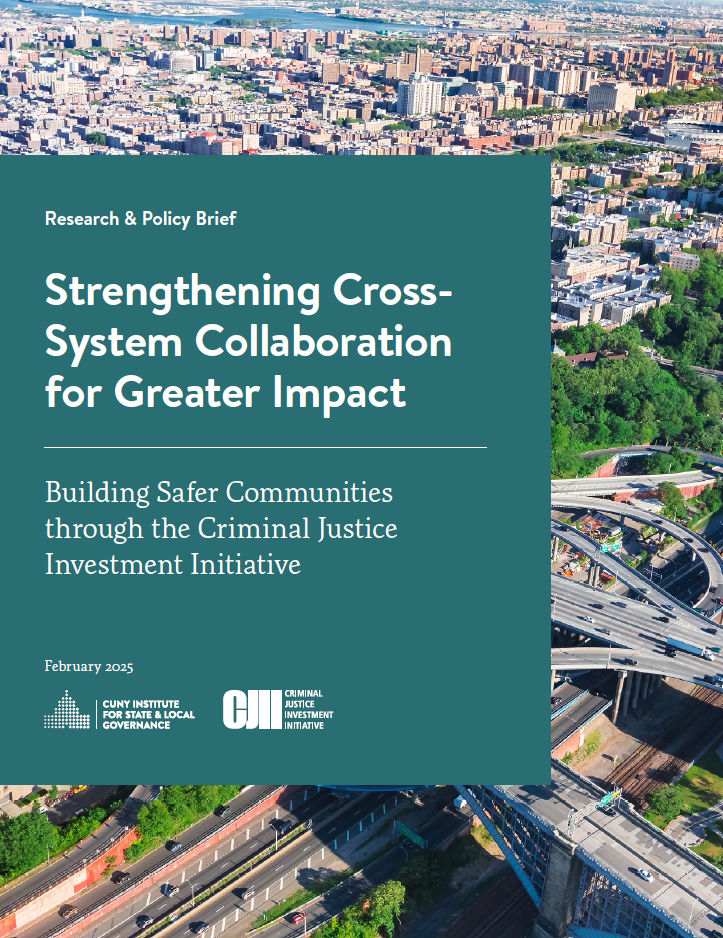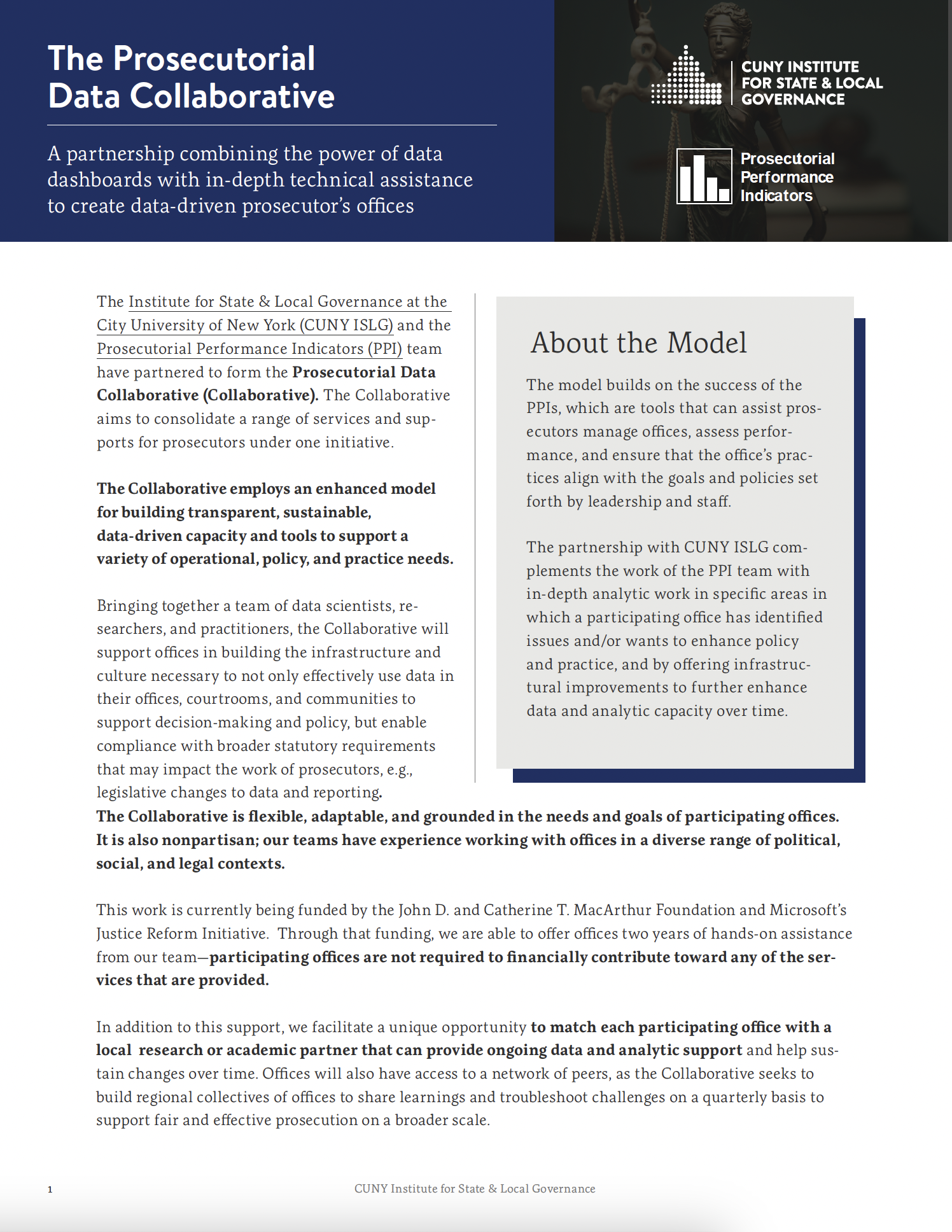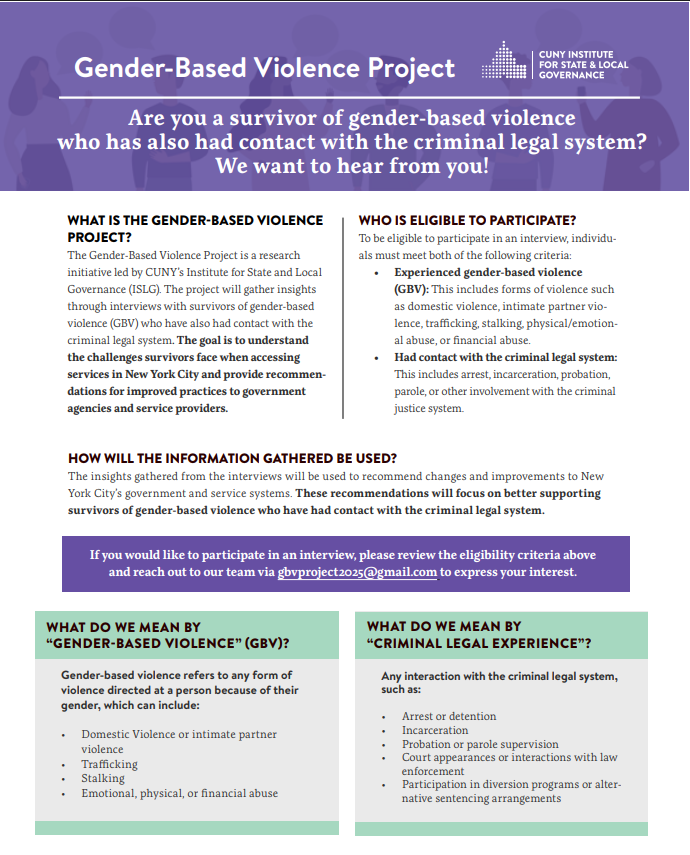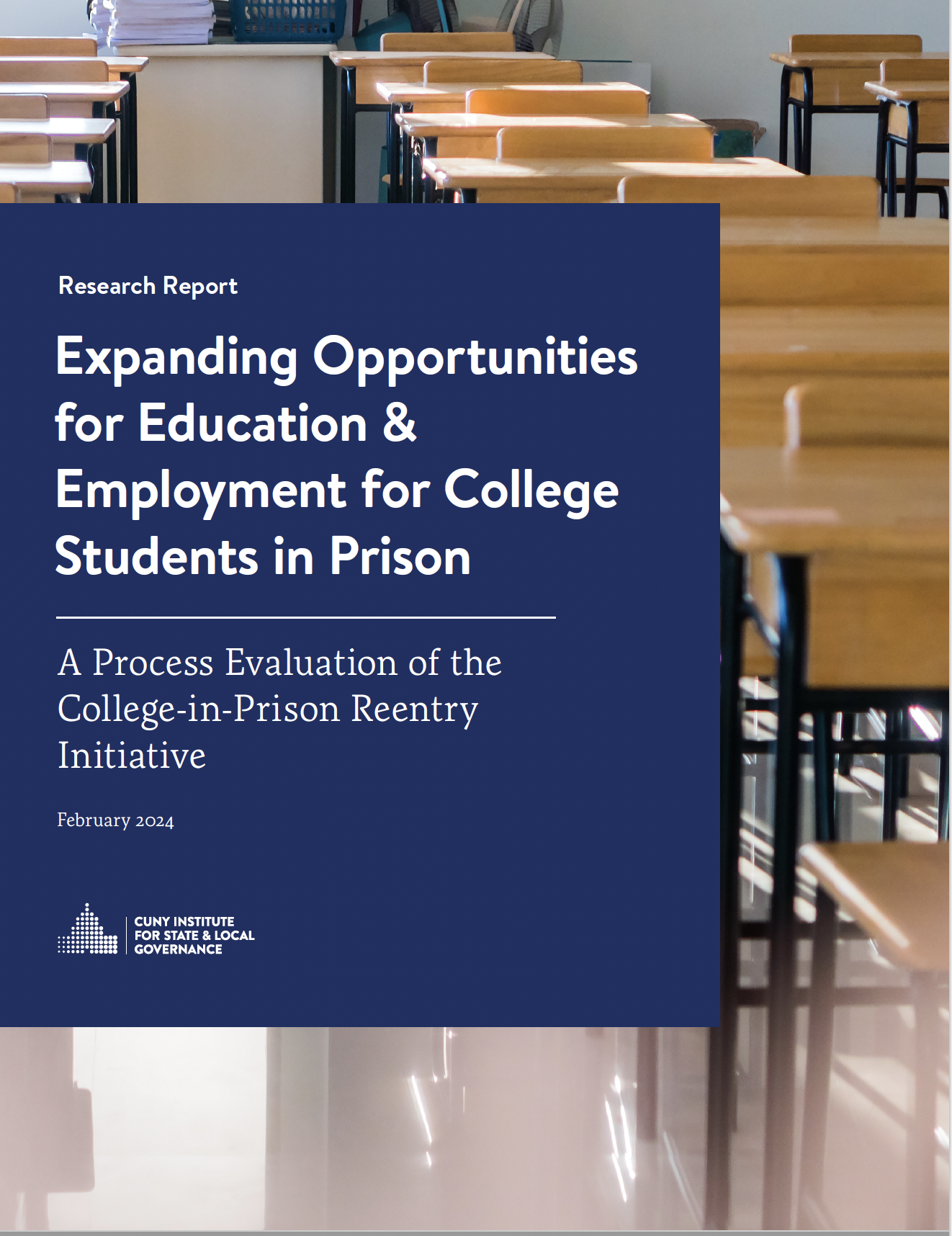RESOURCES
Knowledge Center
Outcomes, discoveries, and analysis from our breadth of good governance initiatives.

The Community-Based Restorative Justice Program: 2024-2025 Grantee Yearbook
This Yearbook was created to acknowledge a year’s worth of incredible work from the 16 Community-Based Restorative Justice program grantees during the End-of-Year Community Forum, a two-day gathering of grantees, philanthropy partners, and restorative justice practitioners on June 16th and June 17th, 2025.

A Blueprint for Social Service Navigation in NYC and Beyond
Drawing from a wealth of experience developing service navigation programs as well as research on data-informed, community-responsive approaches, this brief provides a guide to developing navigation programs that can help government and public institutions connect communities with care, creating safety and opportunity for all.

The Criminal Justice Investment Initiative: Synthesizing a Decade of Innovation
Reflecting on the past decade of work, this series of briefs take stock of CJII’s goals in key areas, dives into case studies of the real-life impact community organizations achieved, and provides a blueprint for practitioners, researchers, policymakers, and funders to shape the future of public safety partnerships.

The Prosecutorial Data Collaborative
Bringing together a team of data scientists, researchers, and practitioners, the Collaborative supports state and local prosecutors in building the infrastructure and culture necessary to not only effectively use data in their offices, courtrooms, and communities to support decision-making and policy, but to enable compliance with broader statutory requirements.
![[From Our Partners] A Community-Focused Approach to Addressing Trauma: Lessons Learned from the Center for Trauma Innovation](https://images.squarespace-cdn.com/content/v1/5fcea962a1b4d771ad256fcc/4d92b04e-7218-43d8-8576-feb0ba0379cf/Process+Report+Cover+Screenshot.png)
[From Our Partners] A Community-Focused Approach to Addressing Trauma: Lessons Learned from the Center for Trauma Innovation
This brief showcases how learning communities can be used to support innovation, growth, and collaboration among organizations working toward shared outcomes. The Center for Trauma Innovation, a CJII-funded project, is used as a case study.
![[From Our Partners] Evaluation of the West Harlem Community Reentry and Restoration Project ](https://images.squarespace-cdn.com/content/v1/5fcea962a1b4d771ad256fcc/9bb14f13-b3d2-474b-9416-b5e2f2ff5ec2/full+-+Evaluation+of+the+West+Harlem+Community+Reentry+and+Restoration+Project.png)
[From Our Partners] Evaluation of the West Harlem Community Reentry and Restoration Project
Through credible messengers, restorative justice, and a capacity-building incubator, WHCRRP provided direct services to those in Manhattanville and the Grant Houses and surrounding area in the West Harlem community.

Supporting Survivors of Gender-Based Violence Impacted by the Legal System
The project will gather insights through interviews with survivors of gender-based violence (GBV) who have also had contact with the criminal legal system. The goal is to understand the challenges survivors face when accessing services in New York City and provide recommendations for improved practices to government agencies and service providers.

Building Better Public Sector Data
This brief details how CUNY ISLG staff work with governmental agencies, nonprofit organizations, and other partners to effectively collect, maintain, and use data, especially in the face of time and resource constraints.
![[From Our Partners] Build-Out of Student Services Report: Findings from the Process Evaluation](https://images.squarespace-cdn.com/content/v1/5fcea962a1b4d771ad256fcc/ba263fec-6abe-48c4-bee8-c25eb4a19844/Vera+Boss+process+evaluation+full+cover.png)
[From Our Partners] Build-Out of Student Services Report: Findings from the Process Evaluation
In 2019, College and Community Fellowship (CCF) received CJII funding to launch the Build-Out of Student Services (BOSS) project, which provides reentry programming based in New York City that develops education and career skills specifically among formerly incarcerated women.

Expanding Opportunities for Education & Employment for College Students in Prison
CIP funded seven colleges and universities to deliver college instruction across 17 prisons in New York from Fall 2017 through Spring 2022. CUNY ISLG conducted a multiyear process evaluation of the Initiative to assess its implementation
![[From Our Partners] Programs for Foster Youth Transitioning to Adulthood Evaluation](https://images.squarespace-cdn.com/content/v1/5fcea962a1b4d771ad256fcc/73c32228-3431-4ee6-b728-82e7bbf7166c/WHCRRP+mid-eval+full+cover.png)
[From Our Partners] Programs for Foster Youth Transitioning to Adulthood Evaluation
Graham Windham’s “Graham SLAM (Support, Lead, Achieve, Model)” and The Door’s “Academy” offer New York City foster youth transitioning to adulthood personalized support through mentorship, coaching, and youth-driven services.
![[From Our Partners] The NYC Health Justice Network Recidivism Evaluation Study](https://images.squarespace-cdn.com/content/v1/5fcea962a1b4d771ad256fcc/4d9294c0-a174-4547-b5a7-4bac858531b5/NYC+HJN+Evaluation+report+full+cover.png)
[From Our Partners] The NYC Health Justice Network Recidivism Evaluation Study
The study found a strong, significant, and consistent effect of college participation on reducing new convictions following release. Participation in this form of postsecondary education reduced reconviction by at least 66 percent.
![[From Our Partners] The Impacts of College-in-Prison Participation on Safety and Employment in New York State](https://images.squarespace-cdn.com/content/v1/5fcea962a1b4d771ad256fcc/b789df06-689e-45a0-bbcd-d040a9cba9af/The+Impacts+of+College-in-Prison+Participation+on+Safety+and+Employment+in+New+York+State+full+cover.png)
[From Our Partners] The Impacts of College-in-Prison Participation on Safety and Employment in New York State
The study found a strong, significant, and consistent effect of college participation on reducing new convictions following release. Participation in this form of postsecondary education reduced reconviction by at least 66 percent.
![[From Our Partners] Evaluation of the West Harlem Community Reentry and Restoration Project](https://images.squarespace-cdn.com/content/v1/5fcea962a1b4d771ad256fcc/73c32228-3431-4ee6-b728-82e7bbf7166c/WHCRRP+mid-eval+full+cover.png)
[From Our Partners] Evaluation of the West Harlem Community Reentry and Restoration Project
The West Harlem Community Reentry and Restoration Project (WHCRRP) is an initiative funded under CJII in response to the June 2014 law enforcement intervention that led to the arrest and indictment of 103 individuals living in the Manhattanville and Grant public housing developments and surrounding areas.

Reform in the Media: Analyzing How Local Media Covered New York’s Criminal Legal Reform Narrative
Our findings suggest that media coverage of the reforms lacked details about the legislation’s purpose and specific changes to the pretrial process, disproportionately focused on perspectives that were critical of the legislation, and emphasized the perceived negative impacts to community safety.
![[From Our Partners] FamilySafe Project Evaluation: Implementation and Outcomes of Family-Focused Counseling for Survivors of Gender-Based Violence ](https://images.squarespace-cdn.com/content/v1/5fcea962a1b4d771ad256fcc/98d9a429-34de-40f9-91bd-5634327ddb0f/Report+cover+of+FamilySafe+Project+Evaluation.png)
[From Our Partners] FamilySafe Project Evaluation: Implementation and Outcomes of Family-Focused Counseling for Survivors of Gender-Based Violence
Sanctuary and STEPS successfully designed and continue to implement a trauma-focused model of programming that treats diverse families as a unit and facilitates communication and collaboration between the adult and child treatment staff
![[From Our Partners] Addressing Trauma Among School-Aged Children](https://images.squarespace-cdn.com/content/v1/5fcea962a1b4d771ad256fcc/d20aa296-5ce3-482e-bdad-912acc2c3e90/MP-City+Process+Eval+Report+Cover.png)
[From Our Partners] Addressing Trauma Among School-Aged Children
Margaret's Place aims to raise awareness about experiences of trauma and violence among youth and provide direct interventions for those impacted, with particular attention to the many types of violence (e.g., home, community, and dating) experienced by young people. This report presents findings from the process evaluation of Margaret’s Place that was conducted between 2019 and 2021.
![[From Our Partners] Youth Opportunity Hubs: Fostering Collaboration. Building Resilience.](https://images.squarespace-cdn.com/content/v1/5fcea962a1b4d771ad256fcc/5d94a3aa-496a-431f-b2ff-b815bc6d7125/Youth+Opportunity+Hubs+Fostering+Collaboration.+Building+Resilience.+Policy+brief.png)
[From Our Partners] Youth Opportunity Hubs: Fostering Collaboration. Building Resilience.
The Youth Opportunity Hub (YOH) Initiative was designed to prevent or reduce criminal legal system interactions, improve life outcomes, and provide support for youth by fostering access, collaboration, and partnership among social service providers. The final evaluation report, and its associated policy brief, offers a look at the development, implementation, and outcomes of the Initiative, as well as offers lessons learned and recommendations for other organizations seeking to implement similar programs.
![[From Our Partners] At the Intersection of Probation and Jail Reduction Efforts](https://images.squarespace-cdn.com/content/v1/5fcea962a1b4d771ad256fcc/9626f8bd-e95a-4ffe-a9ad-0fd7b7330d92/Transitional+Housing+Support+cover.png)
[From Our Partners] At the Intersection of Probation and Jail Reduction Efforts
This study aimed to decipher the system-level trends in jail incarceration for probation violations and the key pathways to jail incarceration for those individuals currently on probation.
![[From Our Partners] The Transgender Healing and Resilience Initiative for Survivors of Violence: Final Evaluation Report](https://images.squarespace-cdn.com/content/v1/5fcea962a1b4d771ad256fcc/18474acb-370b-46fd-a015-8effe2d8a663/THRIV+final+eval+full+cover.png)
[From Our Partners] The Transgender Healing and Resilience Initiative for Survivors of Violence: Final Evaluation Report
While historically facing disproportionately high rates of exposure to violence, transgender and gender non-binary (TGNB) folks also face barriers to accessing mental health care. To help fill this gap in service, the the Mount Sinai Center for Transgender Medicine and Surgery (CTMS), with funding from CJII, created the Trauma Healing and Resilience Initiative for Transgender Survivors of Violence (THRIV).
